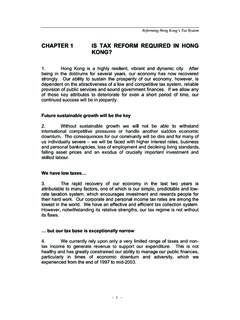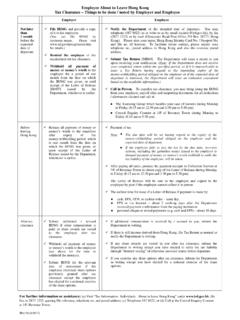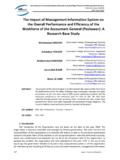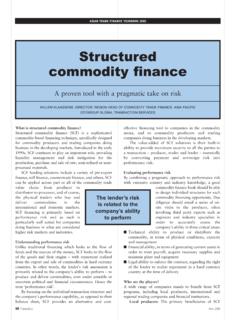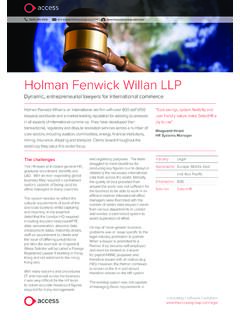Transcription of THE LABOUR COURT OF SOUTH AFRICA (HELD AT …
1 THE LABOUR COURT OF SOUTH AFRICA . (HELD AT JOHANNESBURG). CASE NO. JR 644/09. In the matter between: BOMBARDIER TRANSPORTATION. (PROPRIETARY) LIMITED Applicant and LUNGILE MTIYA 1ST Respondent THE COMMISSION FOR CONCILIATION, MEDIATION AND ARBITRATION 2ND Respondent DERICK JOHANNES 3rd Respondent BOMBARDIER TRANSPORTATION (CHINA). LIMITED 4TH Respondent JUDGMENT. VAN NIEKERK J. Introduction [1] This is an application brought in terms of s 158(1) (g) of the LABOUR Relations Act in which the applicant seeks to have a certificate of outcome issued by the first respondent ( the commissioner') reviewed and set aside. The applicant claims that when she issued the certificate, the commissioner exceeded her powers (because there was a jurisdictional challenge that had not been resolved), that she ignored relevant evidence indicating that there was a jurisdictional issue to be decided, and that she committed misconduct in the form of a material error of law.
2 The applicant further contends that the COURT should decide the jurisdictional issue by substituting the commissioner's ruling with a decision to the effect that the CCMA lacks jurisdiction to entertain the third respondent's referral of his unfair dismissal dispute. 1. The facts [2] The factual background to the application is briefly the following. The third respondent ( Johannes') was employed by Bombardier China as a commercial director. He was engaged in terms of a fixed term contract, initially to expire in June 2008. Johannes was assigned to SOUTH AFRICA to work on the Gautrain Project, and that it was agreed that his remuneration would be paid through Bombardier Canada's payroll to Johannes's bank account in Hong Kong, the city of which Johannes is a resident. The contract contains a choice of law clause in terms of which its terms are to be interpreted and enforced in accordance with the laws of Hong Kong.
3 Various discussions took place between the applicant and Johannes concerning an extension of the contract. On 18 September 2008 Bombardier China advised Johannes that his contract would be extended for a further 6 months only, a period that included agreed notice. The applicant claims that Johannes subsequently left its employ on 31 October 2008 in circumstances where he (Johannes) terminated the contact. [3] On 10 November 2008 Johannes referred an unfair dismissal dispute to the CCMA. On 2 February 2009, the applicant filed an application in terms of Rule 14 of the CCMA rules setting out a number of grounds on which it contended that the CCMA lacked jurisdiction to entertain the dispute. These included a challenge to the CCMA's territorial jurisdiction (on the basis that the law of Hong Kong applied) and a denial that the applicant had dismissed Johannes.
4 [4] At a hearing convened on 13 February 2009, it was agreed that Johannes would file an answering affidavit and that the matter would be set down for argument on 14 April 2009. On 13 February 2009, the commissioner issued a certificate of outcome recording that the dispute remained unresolved. An explanatory note, dated 16 February 2009, was also sent to the parties. The note reads as follows: The above case was scheduled for a conciliation of the 13th February 2009 before Commissioner Lungile Mtya. 2. The scheduled conciliation could not commence because the employer representative, Fritz Malan, raised a jurisdictional point and also requested a Senior Commissioner to deal with the matter. The commissioner recorded that the parties agreed to re-schedule on the 14th April 2008 (sic).
5 It would seem that parties did not take cognizance of the provisions of section 135(2) of the LABOUR Relations Act (LRA). This matter was initially filed with the CCMA in November 2008 and the provisions of Section 135(5) must apply. The commissioner will thus issue a certificate. The applicant may apply for arbitration and the employer can then raise the jurisdictional issue at arbitration . [5] The applicant filed this application in response to the certificate. The applicant relies primarily on a judgment by this COURT in EOH Abantu (Pty) Ltd v CCMA & another (2008) 29 ILJ 2588 (LC) to contend that a commissioner was bound to decide any jurisdictional point raised in conciliation proceedings before issuing a certificate of outcome, and that her failure to do so constitutes a reviewable irregularity.
6 The relevant legal principles [6] Two different approaches to the status of certificates of outcome issued in the face of jurisdictional challenges have emerged. The first is that adopted by this COURT (per Basson J) in EOH Abantu (Pty) Ltd v Commission for Conciliation, Mediation and Arbitration & another (supra) and Avgold Target Divisions v CCMA [2010] 2 BLLR 159 (LC). In terms of this approach, the CCMA's jurisdiction to conciliate is dependent on a number of jurisdictional facts having been satisfied. While the CCMA may not rule on its own jurisdiction, it must assess whether it has jurisdiction and must do so before conciliation commences. If a conciliating commissioner issues a certificate of outcome without the jurisdictional conditions having been met, a commissioner later appointed to arbitrate the dispute has no power to dismiss the matter on the basis of a lack of jurisdiction, even if the arbitrating commissioner thinks that the conciliating commissioner's ruling was wrong.
7 3. Where a conciliating commissioner declines to make a decision on jurisdiction but has nonetheless issued a certificate of outcome, the arbitrating commissioner is bound to arbitrate the dispute unless the certificate is reviewed and set aside. In short, a certificate of outcome confers jurisdiction on the CCMA to adjudicate a dispute referred to it, and remains valid and binding on the parties until such time as it is reviewed and set aside. [7] This approach draws much of its inspiration from Fidelity Guards Holdings (Pty) Ltd v Epstein NO & others (2000) 21 ILJ 2382 (LAC), a case in which the LABOUR Appeal COURT held that once a certificate of outcome is issued by a conciliating commissioner, an arbitrating commissioner has jurisdiction to determine a dispute until such time as the certificate is reviewed and set aside.
8 That case concerned a dispute that had been referred to the CCMA outside of the statutory time limits. The employer was clearly aware of the point, but remained silent until the stage of an application to review the arbitration award in the employee's favour. In the review proceedings, the employer contended that in the absence of a timeous referral, the CCMA did not have the necessary jurisdiction to make the arbitration award. The LABOUR Appeal COURT rejected this submission and as I have indicated, held that once a certificate of outcome has been issued stating that the dispute remains unresolved, the CCMA has the jurisdiction to arbitrate the dispute. [8] The first approach also holds that is peremptory for a conciliating commissioner to deal with a jurisdictional issue if it appears during the conciliation phase that a jurisdictional issue has not been determined.
9 Support for this view is found in the provisions of Rule On this basis, in EOH. Abantu, the COURT concluded: In other words, where a party raises a jurisdictional point during conciliation or where it appears that there exists a jurisdictional reservation, such point must be determined by the conciliation commissioner. Where the conciliating commissioner fails to do so, such a refusal will constitute a reviewable irregularity.. 1. Rule 14 states: If it appears during conciliation proceedings that a jurisdictional issue has not been determined, the commissioner must require the referring party to prove that the Commission has the jurisdiction to conciliate the dispute through conciliation . 4. [9] To the extent that this approach is based on the Fidelity Guards judgment, it is not clear to me that the judgment serves as authority for the assertion that a certificate of outcome affords the CCMA jurisdiction to arbitrate an unfair dismissal dispute.
10 In truth, Fidelity Guards is concerned only with the proposition that a failure to review an administrative act timeously may result in that act acquiring the force of law (in the sense that it will not be susceptible to review) even though the act is invalid and unlawful. [10] The alternative approach to the status of certificates of outcome issued in the face of a challenge to the CCMA's jurisdiction is that set out in EOH. Abantu (Pty) Ltd v CCMA & others [2010] 2 BLLR 172 (LC). In that case, the COURT (per Cele J) held that Rule 14 means no more than that a conciliating commissioner should determine whether or not the referral alleges that the respondent is an employer and that the referring party is an employee who has been dismissed (at 184G). If no such allegation is made, the commissioner should issue an advisory jurisdictional ruling' to the effect that the CCMA has no jurisdiction to conciliate the dispute.










